LOVE, UNSTOPPABLE
The ties that bind
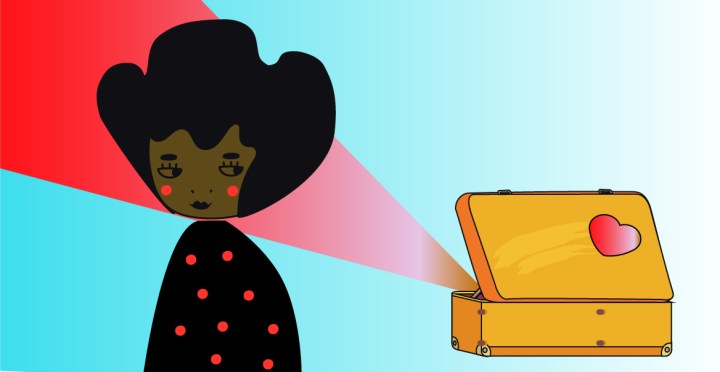
Growing up, my family is not into ostentatious notions of showing love. We don’t go around hugging and kissing, calling out, ‘Love you!’ Our love is stoic, quiet. But you never doubt that it is there.
The clouds are thick and grey and the rain beats down on the windowpanes.
My mom tells my younger sister, Mary, and I to dress warmly, we’re going to the library. Excited, we scramble into the back of the car and my mom navigates her way through the pelting rain. At the library, we walk around, scanning the shelves, clutching our green library cards. I find a battered copy of Clever Polly and the Stupid Wolf and pull it off the shelf. The blue and white cover with a wolf wearing an apron and a sunhat and holding a basket while looking beguiling at a little girl says it all. This is a book that I can lose myself in.
When we get home, we race from the car to the house, outrunning the rain. Still, we are drenched. We change into fresh clothes, grab our library stash and climb under a blanket. My mom is in the kitchen making pea soup. The aroma of onions and peas fills the house. My head is in my book, where the wolf explains that poetry is not just about simple rhymes. That it tells us something about the meaning of life. He goes on to recite a poem about cooking children. Thrilled by the wolf’s audacity, I turn the page. Overleaf is what looks like a piece of greasy fried egg, lodged in the middle of the book. A lost remnant of someone’s meal. I am horrified, angry with the person who has ruined the perfection of the day. I close the book, my reading time ruined. Yet, when I look back on this day, it’s not the imperfection, but the perfection that stands out. I remember feeling safe. Knowing my mother was nearby while a storm raged outside. The joy of book hunting. Of being warm. Of spooning hot soup into my mouth. The sense of being loved and cared for.

Image design by Marushka Stipinovich for Maverick Life
***
It is early Easter Sunday morning. My parents take my two older sisters, Des and Lynn, to our church in Parkwood. My sisters sing in the church choir, wearing long flowing robes which give me much joy, because it makes them look ridiculous. My dad is a church warden and passes the plate around at collection time. Then, with great ceremony, he walks the length of the aisle to offer the money to the priest at the altar. I love the officiousness of it. But this particular Sunday, my youngest sister, Mary, and I are left at home. I suspect it has something to do with the fact that we are a churchgoing liability. When everyone kneels to pray, we crawl under the pews to check out the shoes of the people kneeling in front of us. We complain about being hungry and wanting to go home.
So when I wake up on Easter Sunday to find that we are alone, I am overjoyed. The first order of business is to wake up Mary. This is not a job for the faint hearted. Mary has the unusual ability to sleep with her eyes partially open, a freak of nature. Later, I will discover that I can charge five cents a viewing to children in the neighbourhood. But these were the days before I discovered the pecuniary benefits of Mary’s abilities. I spend a long time watching her, waving my hand over her eyes. Eventually, I poke her in the ribs. She wakes up and I drag her, sleepy-eyed, to the place where the Easter eggs are hidden. We discuss the matter at length and eventually decide that, technically speaking, it is Easter and no one can get into trouble for getting on with the job of eating the eggs. We sit cross-legged and tear off wrappers and begin the work of eliminating the Easter eggs. What we do that day must be something like doing drugs – you know that it cannot be good, but you’re on such a high, you just keep going. Mary is a messy eater – her chin and parts of her cheeks are covered with a dark brown glob. Looking at her face, it dawns on me that things do not look good. We will be in trouble when my parents get back. I feel twitches of fear and say a silent prayer that something will happen so that they won’t come home for a long time. Maybe the sky will open and the riders of the chariot will descend and mark the beginning of the apocalypse.
I have no memory of what happened when my parents got back. In all probability, we got off with a tongue lashing. But what I do remember is this: the warmth of gathering around the lunch table. The roast lamb with sprigs of rosemary, the special spaghetti that my mom made on Sundays, orange and garlicky, and the crispy roast potatoes. The sense of belonging to something bigger than myself.
***
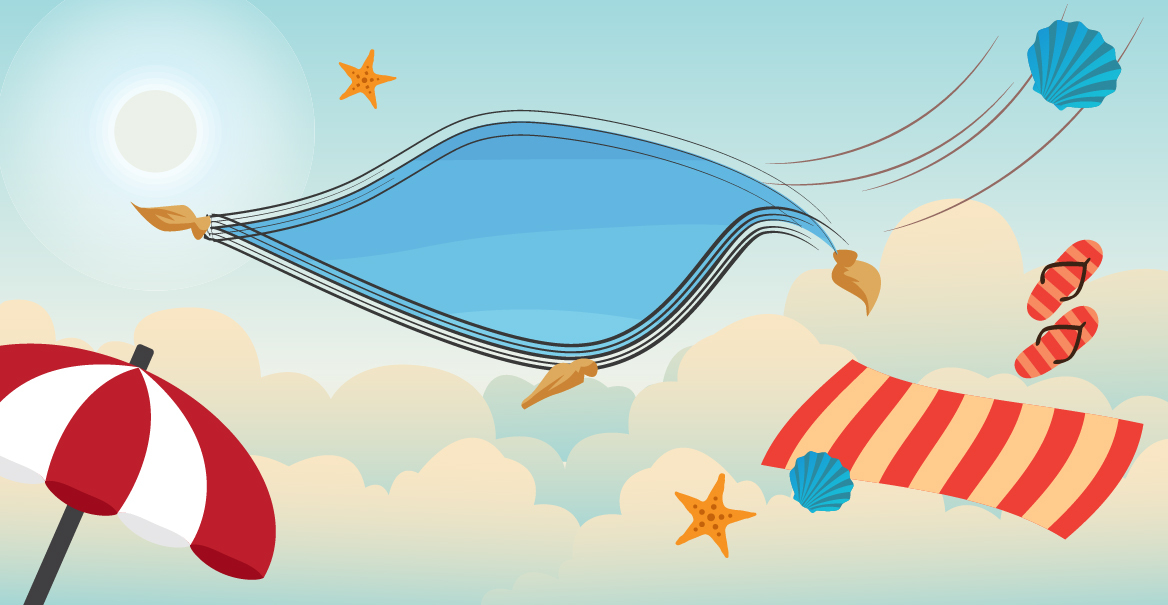
Image design by Marushka Stipinovich for Maverick Life
My parents take Mary and me on holiday. Going away is an anomaly in my childhood. I only have two memories of going on holiday. On this occasion, we drive to Durban to spend a few days near the sea. The plan is to stop over at other places on the way there. We are bundled into the car at an ungodly hour one morning. We sit on the back seat, half asleep, covered with blankets and propped up with books and Tupperware with road food. On the way, my dad’s car breaks down. We sit on the road in the middle of nowhere. The sun is scorching hot. We wait and wait and wait. Eventually my dad flags down a car and the driver agrees to take him to the nearest town to get help. By the time we get to Durban in a tow truck, we are world weary, the holiday having lost its sparkle.
Mary and I decide to go to the beach, to claim back the splendour of the only out-of-Cape Town trip we will ever make as children. We put on our bathing costumes, grab some towels and make our way to the beach. On the beachfront is the most amazing extravaganza we have ever seen. Women sit on the floor, selling beaded jewellery, crocheted tops, and woven baskets. We’re entranced by an explosion of colour, by the women calling out and offering to show their wares. After a while, we make our way to the beach, digging our toes into the sand, drawing in the smell of the sea. In front of us is a sign. I can read, but suddenly, I am insecure about my ability to understand what I am reading. The sign says, “Whites Only”. I look to Mary for direction, but she stares blankly ahead. I’m not sure if she has seen it, but I don’t want her feelings to be hurt. (Years later, Mary will tell me that she did in fact see it. That she remembers the crushing disappointment and fear). I tell her to turn around, that I want to go back to the hotel. We retrace our steps and make our way back. The sun beats down, beads of perspiration line my forehead. A swim in the sea would have been really, really nice. Not that we can swim, having had no occasion to learn.
We get back to the hotel and find that my parents have gone out. Mary and I have a special thing that binds us to each other. We are the creators of imaginary stories. We dream up alternative universes in which we are gods, acting out the dramatic lives of the people in our make-believe world. Today, we opt to play ourselves at the sea. We pretend that the blue carpet is the ocean. We throw ourselves down on it and begin to move our arms in a swimming motion. When we have cooled down, we stretch out on our towels to suntan. The confines of the room become a real world, with real sea and real sand. We get as much as we possibly can out of it, without it being the real thing. Later, my parents return. I whisper in my dad’s ear about the sign. And he says the thing that restores my dignity, “Always remember that you are no less than anyone else. That beach belongs to you.”
***
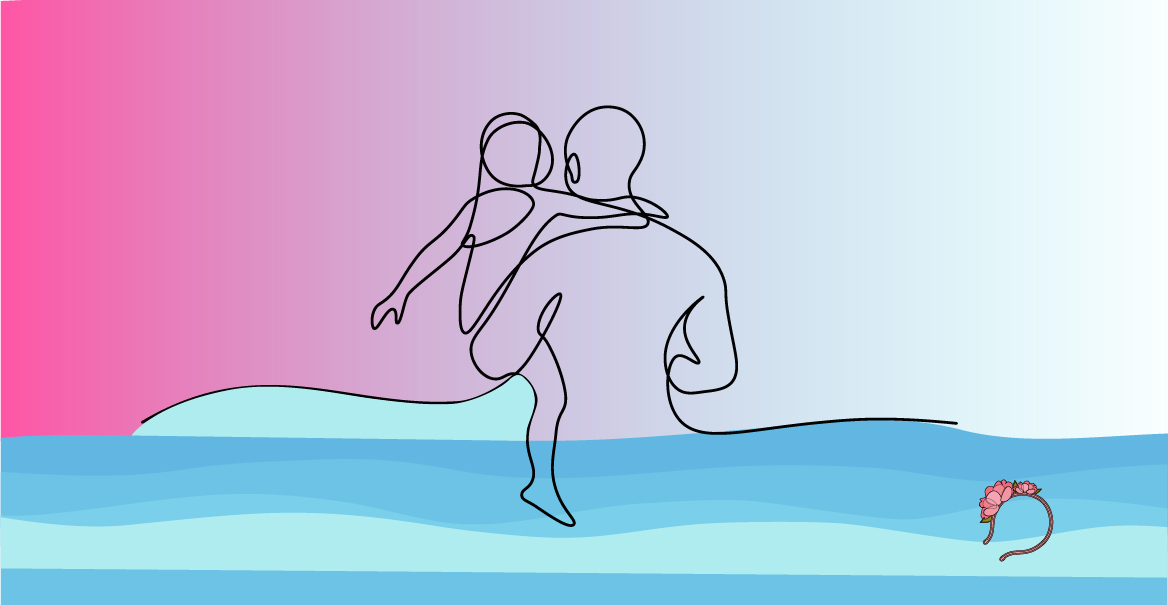
Image design by Marushka Stipinovich for Maverick Life
It is on this same holiday that I almost drown when we stop over at a place where we can “swim”. Mary has a cerise alice-band with a flamboyant plastic flower on one side. I covet it with all my heart and soul, but it belongs to her fair and square. Desperately wanting it to grace my head for a day, I ask her to lend it to me one morning. She concedes and I place it on my head, immediately feeling taller, brighter, and prettier. We go to a lagoon somewhere – I can’t remember where. I am in my bathing costume and the water feels cool against my skin. I wade in further. The alice-band is like a crown on my head, I am a queen. My feet sink into a hole and I am pulled underwater, unable to right my balance. Water fills my lungs and I panic as I realise that I have no control over what is happening. This is what death must be like – clinging to life, while surrendering to the inevitable. The next thing I know, my dad is there next to me, drowning with me. I am comforted by his presence and hang on to him as we dance underwater, struggling to resurface to the world of the living.
Later, Mary will tell me how my dad rushed in to save me as she sat terrified and helpless on the shore – how she watched the water suck him under. A man in a smart shirt walks by and she calls out to him. He rushes into the water and rescues me first. He lays me down on the sand and goes back to save my dad. When we get back to the hotel, my mom pulls me into her embrace and soothes it all away. Sadly, the pink alice-band dies that day. It is the only thing the man in the nice shirt does not save.
***
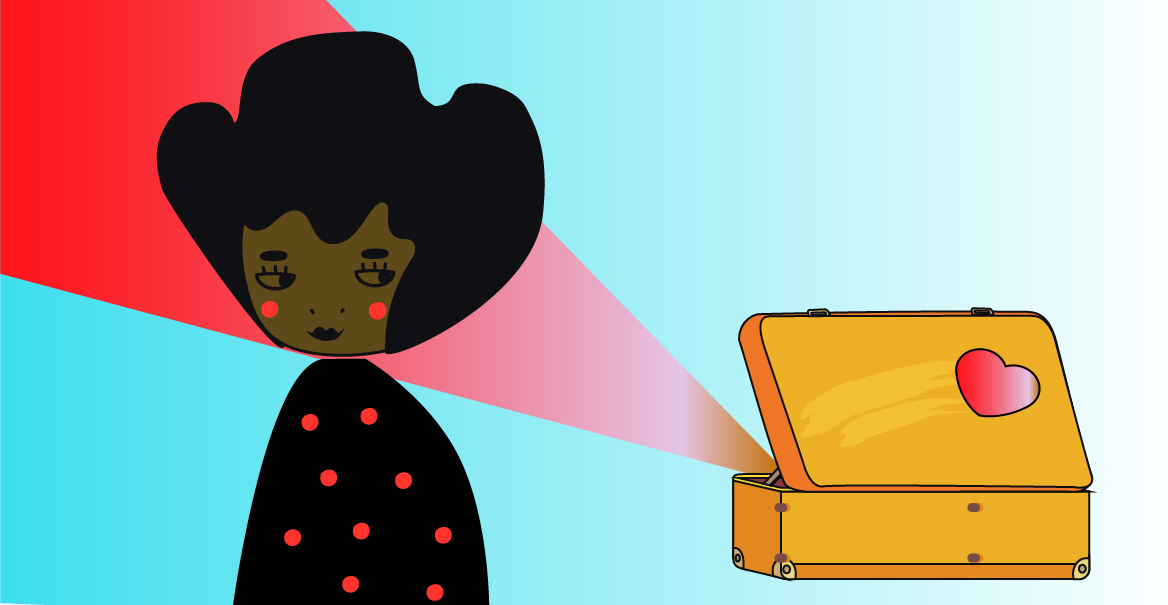
Image design by Marushka Stipinovich for Maverick Life
Growing up, my family is not into ostentatious notions of showing love. We don’t go around hugging and kissing, calling out, “Love you!” Our love is stoic, quiet. But you never doubt that it is there. Mostly, we show love in practical ways. My dad works hard, long hours to provide for us. My mom cares for us in ways that transcend into devotional reverence. My older sisters plait our hair for us, although they aren’t very good with fish plaits.
I decide to show Mary how much I love her by planning the massivest surprise ever. At school, on Mondays to Thursdays, we get bowls of watery soup served from enamel buckets with a slice of dry bread at lunchtime. Fridays are special days, it’s the day the Bible talks about when it says that the barns will be filled with plenty and the vats will burst with wine. Instead of dry bread, we get bread with jam. We obviously don’t get the vats of wine. I can’t wait for Fridays. I usually take my soup and bread to a corner in the playground where I sit in the sun and lick the jam off my bread. But my plan this Friday is that Mary will be blessed with this treat. I line up with the others in my class, bowl in hand, and my teacher scoops out some soup. I take my slice of bread and hurry back to my desk. Opening up my case, I slip the bowl of soup inside, putting the bread next to it. I shut it firmly, resisting the temptation to devour it. When school ends, I pick up my little box-like case by the handle and walk home, anticipating the moment when I will hand over my surprise to Mary.
When I get home, I shout out to her to hurry, I have a present. Mary stands in front of me, expectant. I open my case. Incredulously, the soup has vanished. Instead, my books are filled with lumpy bits of red jam and the odour of carrots. But here’s the thing about Mary, it doesn’t take much to win her love. She seems happy with the mess.
***
It is Friday night. Mary and I are ensconced on the couch watching TV. My mom sashays in, turns the TV off, pulls a record out of its sleeve and puts it on the turntable. The sound of Chris de Burgh’s Lady in Red fills the room. These days, my mom likes to alternate between the husky tones of Percy Sledge’s When a Man Loves a Woman and Lady in Red. My dad walks into the room and pulls her into his arms. They hold on to each other and begin to sway to a beat that is fuelled with adult things. Mary and I sit, straight as poles, too horrified to move. Sweet Jesus. Have they forgotten that we are here? With a look that says “Come hither”, my dad takes my mom by the hand and leads her towards their bedroom. The door shuts with an unspoken, “Keep out.” Mary and I avoid making eye contact. It would be an admission that we have just lived through something that neither of us wants to talk about. But I know that we are both thinking the same thing, ‘How could they do that to us?’
***
In my twenties, after starting my first job at an NGO, I call my parents to invite them to see a movie with me on Sunday afternoon. My mom answers the phone in that urgent, expectant tone she has, the one where she’s expecting you’re going to tell her that someone has died. I ask how she is and I hear my dad yell, “Who is it?”
“It’s Joy,” she yells back.
I go on to tell her about work, the highs and lows of my week.
“Ask her how work is,” my dad yells.
“Why don’t you ask her yourself?”she shouts back.
“I don’t feel like talking to her,” my dad replies.
“Your dad wants to know how work is,” my mom says.
“I just told you,” I say, wondering, for the umpteenth time, if I have fallen down the hole in Alice in Wonderland’s world.
“Thelma!” my dad shouts, “Did you hang my jersey on the washing line? I told you I like to lay them on a flat surface.”
“No I didn’t,” my mom yells, indignant.
“Strange how when you look for the person who messed things up, they’re nowhere to be found. Ask Joy if we should make steak and kidney pie for her on Sunday,” my dad says.
“Your father wants to know if we should make steak and kidney pie for you on Sunday,” my mom says.
“I know, I can hear him,” I say, exasperated.
This is how phone calls with my parents go. While I know what to expect, it still comes as a shock that they seem to wait for one of us to call so that they can have all the conversations that they’ve been meaning to have between them. Often, I’m left hanging for a long time while they’re off on a dialogue of their own.
On Sunday, I meet them at the movies. My dad is a planner. He likes to research things and know exactly what he is doing. But I’m in my twenties and the best plan I make is to wake up and believe that everything will work out. So I’ve given no thought to the film we will see. By the time I arrive at the cinema, out of breath, I am late. My parents have been waiting. My dad is ho-humming, exasperated by the way things are turning out. I quickly choose a film that is about to start. I have no idea what it is about, but I’m sure it will be okay. We sit four rows from the front, my favourite place. I am sandwiched between my parents, my hand diving into a box of popcorn, telling them to shush while the ads play. The film starts. I cannot remember it in great detail, I’m so scarred by the memory of that day. Sadly, it falls within the genre of erotica. The opening scene zones in on a woman’s breast, the camera artistically capturing her nipple. I want to absolutely die at this moment. The first scene is a sex scene between an older man, a university professor and his much younger student. Things go downhill quickly from there. I watch the entire film with cheeks on red alert, burning up a storm. After it ends, we walk out, pretending that nothing has happened.
Tentatively, I ask my mom, “What did you think?”
Her lips pressed tightly together, she says, “Very nice.”
“It’s okay, you can be honest,” I say.
“I hated it,” she replies.
My dad is eyeing me warily.
“Let’s be clear,” he says, “I am never EVER going anywhere with you again.”
“I will wander lonely as a cloud,” he adds for emphasis, a bit of Wordsworth that he likes to sprinkle over every conversation.
***
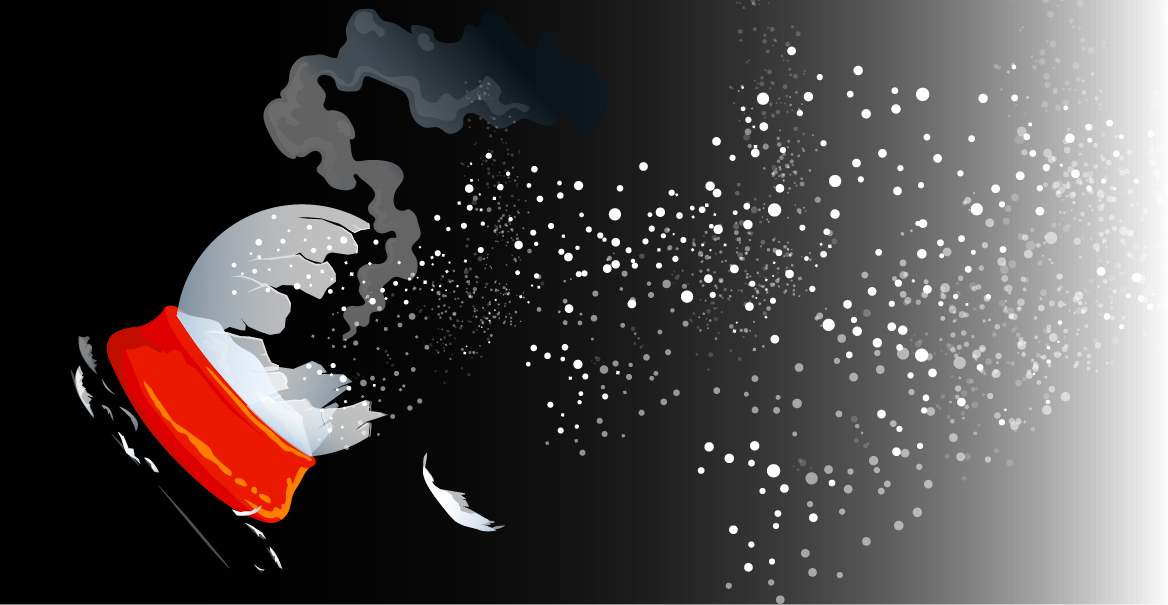
Image design by Marushka Stipinovich for Maverick Life
We sit in a room devoid of personal touch. The doctor explains that my mom has pancreatic cancer, that it is terminal. My mom left school in Standard 2. While she is beautiful and sharp and can tell you a thing or two about the meaning of dreams, she does not know the word “terminal”. It is only once we step outside and she asks me what the doctor just said, that it hits her. She looks at me, her face contorted, and says, “You’re not allowed to fight with your sisters.”
Our family falls into a deep abyss in digesting the news. It’s as if our little glass world with the snowflakes has been thrashed on the floor, the water flooding out, the glass broken. We insulate as we try to hold on to each other, stretch time out.
My Aunty Mavis, my mom’s sister, says to my mom, “I pray to God that if I could take this cross away from you and bear it myself, then I would.” A few months later, she is diagnosed with cancer. Shortly after, she gets out of bed one morning, falls over and dies.
We serve tea and cake in the church hall after Aunty Mavis’s funeral. People sit on chairs, talking, holding cups of tea on their laps. On the periphery, my mom sits alone, a dejected look on her face. I go and sit next to her.
“You okay?” I ask.
She is fighting back tears, wrestling with words.
“I’ve been thinking,” she says, “By the time I die, everyone will be tired of funerals, no one will come.”
I take her hand into mine and say, “That’s not true. But even if it were, I would bus in people from all over the country.”
A month later, my mom leaves us. She drifts into a peaceful sleep at around four in the morning and by quarter to 10 takes her leave, stepping up and out of herself. We sit at her bedside, singing to her.
On the day of the funeral, I pull up at the church, my stomach clenched, my grief visceral and all-encompassing. As I make my way towards the church, I see that it is filled to capacity. My mom was so loved, she touched so many people in such a special way, that the people crowd the back of the church, spilling out of the doors, into an overflow area outside the church. Rousing, exuberant singing fills the church.
My dad, bewildered, says, “Who would have thought that Thelma could pull such a crowd?”
Yet, in fact, we always knew she could.
***
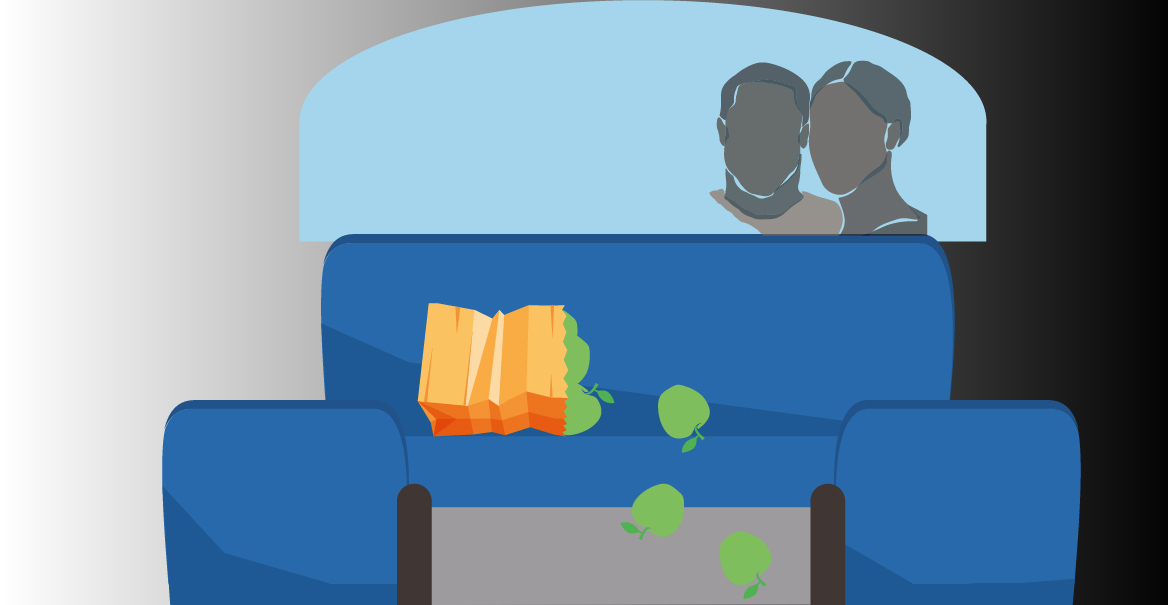
Image design by Marushka Stipinovich for Maverick Life
Two weeks into lockdown, my phone rings as I am hunched over my computer, working on a research paper. It’s my dad’s partner. Her voice laced with concern, she tells me that my dad collapsed in the bathroom. Roots of panic begin to take hold. I ask to speak to him.
He comes on the line, saying, “You’re both over-reacting. I’m fine.”
“I’m taking you to the doctor,” I say.
“No,” he says.
This is how it is with my dad and me. We’re both obstinate, each of us rowing upstream against a strong current.
When I pick him up to take him to the hospital, my dad gets in the car with a bag of fruit.
“These are not ripe,” he says. “We have to take them back to the shop.”
I roll my eyes and toss the bag to the back of the car, where the fruit falls out and rolls under the seat.
When I find it there two days later, parts of my mind splinter, ricocheting off the walls. They mirror back at me – a vast, dark pit of nothingness.
***
We gather for my dad’s funeral on a warm day in May. The sun shines as if nothing has happened. To keep everyone safe in the context of Covid, we limit the number of people to 20, something my dad would have appreciated, being a deeply private person. Lynn and Mary are unable to travel home from abroad and it feels strange not having the full square of the four of us. Because we have to socially distance, there is no gathering around food. I’m saddened by this – there is great comfort that comes with coming together around plates of pies, samoosas and creamy cakes.
***
In the months after my dad’s death, I am haunted. Losing him reignites the loss of my mom. I feel as if I am a book on a shelf where the bookends have been removed – always on the edge of toppling over. I go on a long, scenic journey. One in which I straddle the demands of the present – having to work as if the world has not been upended, hanging out the laundry, holding the pain of a daughter stepping into the jagged path of adulthood. But mostly, I have one foot firmly in the past, conscious of what has been and the fact that I can never again reach out and touch those who are gone.
I dream about my parents most nights. In my dreams they make food for me, squabble about domestic things, we get in the car and go to the beach. Which is surprising. My mom hated the beach. “Too much sand,” she would say. But mostly, it comes down to this – the realisation that they are inextricably woven into every part of my being. I see, hear, and feel them. Always a hologram, never quite within reach, but there all the same. DM/ML
Do you have an unusual, surprising, extraordinary, out-of-the-box story about love? Would you be ready to share it with us? If so, please send us 100 words or more about what makes your story unique and special and one of our journalists might contact you to hear more! We cannot promise we will get in touch (even if your story is amazing) but would love to hear from you. Send your 100 words for Maverick Life’s ‘Love, Unstoppable’ series here.















 Become an Insider
Become an Insider
What a read – absolutely beautiful. I found myself gulping (hard) several times as my eyes filled with tears. Thank you for sharing such a lovely, lovely story of family and the love that they all shared.
Devastatingly brilliant. Best thing ive read all year. So powerful. Thank you
Beautifully written. Thank you for sharing. Resonates strongly.
Touching, beautiful. So much I could identify with.
Loved reading this. It made me laugh out loud, smile and want to cry a little. Thank you for sharing.
What a beautifully written article. I did not cry a little – I cried a lot
There’s a novel here. Shades of Buckingham Palace, District 6.
That was an awesome read! Even with my attention span recently re-trained by Twitter, to 280 chars, YOUR wonderful story kept me locked in ! All the way to the end! Well done!
And such a loving home!
Thank you for sharing,
M
Absolutely remarkable, Joy. Thank you.